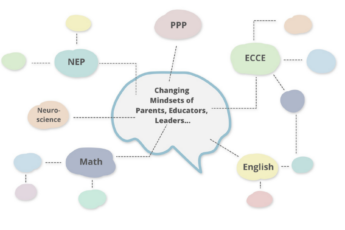Why Soft Skills Training should be Included in the Curriculum?
Education doesn’t confine to just academics and technical skills, it’s about preparing the youth for real life. Grooming a student for college and career success requires much more than just a robust curriculum. It requires exposure to people skills, problem-solving attitude, creative thinking, soft skills training and much more.
Curriculum designers, standards writers, and teachers often work on revitalizing the curriculum to stay relevant with the ever-evolving environment. One of the most discussed subjects among them remains ways to integrate soft skills training among students. These make for an integral part of life, and the earlier an individual learns to recognise and optimally utilize them, the better it is for them to successfully face life.
When we talk about facing life, we mean students encountering real-life situations at work and in their social circles. Workforce leaders often put forth a gap among talented resources, the gap usually highlights lack of skills like communication skills, teamwork, creativity, interpersonal skills, empathy, emotional intelligence, self-awareness, and decision-making.
These skills are categorized as soft skills, an integral part of everyone’s life. Watts and Watts (2008; as cited in Robles, 2012) claims that soft skills account for 85% of success in long-term careers. People with decent professional exposure would very well resonate with this fact.
Soft skills make for desirable qualities that can be easily applied across a variety of jobs. That said, it is essential to make these a part of the curriculum. While there are various ways to learn soft skills, we are listing down some of the most important ones here.
Soft Skills list for Students to Learn
🤹🏽 Communication
This is one of the best vocational skills to learn and develop among students. To develop students’ communication skills, one can encourage them to participate in writing competitions, encourage group discussions or make presentations a part of the daily classroom activity. Students should be able to improve their speech as they move through a class.
🤹🏽 Integrity
Teachers can encourage group assignments, where students have to rely on teamwork. This gives students an opportunity to closely work with their peers, and learn to trust them with the job at hand. The group representative should be given the task to list down every member’s contribution, and should come forward in front of the team to present the same.
🤹🏽 Professionalism
Professionalism needs to be encouraged among students, and teachers can begin with drawing attention to addressing each other respectfully, being on time, coming prepared for a class, and adapting to the needs of others.
🤹🏽 Enthusiasm and Attitude
One of the industrial facts is that employers prefer candidates with a positive attitude over qualification. Simply put, nobody would want to work with a person who doesn’t take initiative or shows no enthusiasm towards work. This can be prevented by encouraging a positive attitude among children. A problem-solving attitude and an understanding to accommodate to situations are qualities that are highly valued in all professions.
🤹🏽 Flexibility
Giving students time-based projects is a good way to teach children to adapt to tight deadlines, and adjust their schedule to accommodate the project. This gives them a real-life experience of doing more than just attending classes and doing their homework.
🤹🏽 Critical thinking
It becomes imperative for one to successfully complete the job at hand, despite the hurdles one may face with an assignment. Assigning students projects that require them to think out of the box will unlock their real potential. This is one way to encourage qualities like critical thinking and problem-solving, which remain the core of soft skills across all professions.
🤹🏽 Networking
This is one of the most useful soft skills in both a corporate and a business set up. The ability to build and maintain professional relations can be very rewarding. Students need to be taught to build their social capital among peers for they can rely on them for notes, information, and physical and emotional support. When children learn to spread out their social web in school, it will help them identify and build social capital at work as well.
As we all know and agree, soft skills have a great influence on one’s life. Hence, they need to be included in the day to day activities among children. One great way to ensure that it’s an integral part of their life is to introduce the subject as part of the curriculum. Although there are no specific classes curated to implement soft skills, it’s essential to explore new ways to integrate them. The article listed the most common soft skills examples for you to begin with.
Square Panda India believes in taking a holistic approach towards teaching and learning. All over development of students takes precedence over students just scoring well in exams. Teachers, educators, principals, and parents need to widen their perspective about their children’s personal growth and development.




Leave a Comment